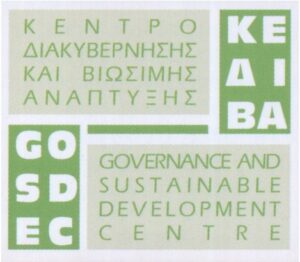Centers / Laboratories
- Home
- Centers / Laboratories
The Laboratory of Research and Study of Innovation of Organizations and Start-ups operates as an integral part of the Department of Public Administration and is committed to provide high-quality academic and practical research linked with the ecosystem of start-ups. It seeks to bring together different stakeholders of the start-up ecosystem, by entering into partnerships, strengthening the cooperation with young scientists, organizing conferences, workshops, lectures and in general seeking synergies with relevant research units in Greece or abroad.
Main Objectives
- Investigate, study and analyse all aspects and applications of modern technology in public organizations and private economic units at the international level.
- Adopt best practices with the method of benchmarking (comparative standardization or evaluation) by relevant organizations and companies in Greece.
- Conduct research and study the organization and operation of start-ups in the international environment.
- Provide know-how related to securing financing of start-ups through European or Greek programs.
- Study the results of the innovation and start-ups in the Greek society and economy and the publication of an annual relevant report.
- Investigate ways and methods of cooperation with public organizations and the two-way exchange of know-how for mutual benefits (win-win).
- Cooperate with the academic community as well as with recognized research units at home and abroad.
- Study the relationship of modern technology with the economy, society, administration, environment, welfare state, employment, citizen service through specialized counseling and educational / training seminars / conferences / lectures.
- Providing know-how related to the purposes of the Laboratory to other countries or international organizations.
- Providing training seminars to students, public bodies and the wider public sector on issues related to modern technology, innovation and start-ups.
- Organize lectures, workshops, seminars, conferences and other scientific events.
- Cover at undergraduate and postgraduate level of teaching and research needs of the Department as well as other academic units of the University in matters that fall within the objects of the Laboratory, as they are defined in this Regulation.
The European Center of Bioethics, Technoethics and Law was founded to conduct high-level academic research in areas such as Bioethics and Technoethics, Genetics and human rights, Artificial intelligence, Protection of personal data, Research into embryos, persons and animals, end-of-life and palliative care matters, and fundamental rights of persons with psychological and neurological disorders (psychoses, Asperger syndrome, dementia, Alzheimer’s, etc.).
Main objectives:
- Conduct research on matters of international, European and national policies in Bioethics, Technoethics and Law, as well on contemporary biomedical advancements and their effect on society, via the institutions of national and comparative law.
- Conduct intensive training seminars for nurses and doctors concerning the Code of Bioethics.
- Conduct educational seminars in English, during the summer term, in collaboration with other scientific institutions.
- Conduct seminars on personal data protection.
- Organize vocational training seminars aimed at the general public.
- Participate in national, European and international research programmes.
- Provide assessment services.
- Publish and translate studies on topics of Bioethics, Technoethics and law.
- Create educational programmes for students on matters relating to Bioethics and Technoethics.
- Collaborate with European and International bodies such as: the European Group on Ethics of the EU, the International Bioethics Committee of UNESCO, the Hellenic Bioethics Committee, the Bioethics Committee of the Athens University Medical School, the Bioethics and Research Committee of the National School of Public Administration, the Bioethics Committee of the Holy Synod of the Church of Greece, regional organizations, academic institutions in Greece and abroad, international Non-Governmental Organizations and Local Authorities organizations.
The Center for Research and Management of Issues on Local Government and Decentralization is established in the Department of Public Administration of the Panteion University of Social and Political Sciences. It is a non-profit Organization and has administrative, managerial and financial autonomy. The Center aims in particular at the research of any issue relater with the Local Government and Decentralization Institutions.
Main objectives:
- Investigate the Institutional – organizational framework of Local Government and Decentralization in Greece.
- Investigate the European dimension of local government and regional government.
- Study the available control systems in Local Government, Local Government Policies and Regional Government
- Investigate new Technologies and the Information Society in Local Government and Regional Administration.
- Explore management, economic, financial, accounting and business issues in Local Government and Regional Government.
- Train elected, public and municipal officials.
- Evaluate training programs.
- Organize professional examinations and operate of relevant training programs for the acquisition of professional qualifications. Provide Professional and Educational Certifications.
- Organize seminars and conferences.
- Provide consulting services and opinions.
- Provide know-how in related areas to third countries, candidate or candidate countries in the EU. and international organizations.
The European Center for Fiscal Studies, founded by decision of the Senate of Panteion University on 24.7.2015, following a proposal of the General Assembly of the Department of Public Administration, is a non-profit research center with administrative, managerial and financial autonomy, which operates within the Department of Public Administration of Panteion University.
Main Objectives
- Promote research and the systematic study of issues that fall within the fields of:
1) the national institutional framework for fiscal management (state budget, Court of Audit, public finances of local government and administrative decentralization, revenue collection, fiscal policy),
2) the European institutional framework for economic governance (EU budget, European Union institutions and fiscal policy, European Court of Auditors, European Anti-Fraud Office-OLAF and protection of the European Union’s financial interests, new European fiscal framework, State aid, loans guaranteed by the Greek State),
3) fiscal governance and administrative science in general, i.e. fiscal transparency, transparency and accountability in public administration, fiscal administration, state organization and decision-making, internal financial control, control over administration, ethics and deontology in public administration, New Public (Financial) Management.
- Collaborate with other educational, research and scientific institutes in general and other public and private bodies from Greece and abroad, in objects of common interest and the cooperation for the promotion and organization of postgraduate courses and MSc programmes in areas of its interest.
- Organize (national and international) conferences, workshops, lectures and other scientific events, as well as seminars in the above thematic units with the participation of Greek and foreign scientists, independently or in collaboration with respective national or international centers, universities, institutions or organizations and Local
- Provide specialized educational and consulting services for the Cen Center’s own account or for the account of other bodies and the elaboration of research programmes that meet the purposes of the Center.
- Develop and operate a website and creating an electronic library and documentation (in foreign language and in Greek) that will include legislation, jurisprudence and scientific literature on these issues at national and European level.
- Conduct any kind of electronic or printed editions or publications (books, studies, journals, etc.), as well as the creation of a scientific publishing series on the Center’s thematic areas of research.

The Governance and Sustainable Development Center, which operates as an integral part of the Department of Public Administration at Panteion University of Social and Political Sciences, is committed to advancing high quality research activity and to address, explore and solve contemporary problems of Public Administration with particular emphasis on the emerging research fields of governance and sustainability. The Center forms a key point of research concerned with the implications of sustainable development (economic, environmental, cultural, institutional), e-governance and its dimensions (B2G, G2C), e-commerce (B2B, B2C), the notion of human rights and other clusters of interdisciplinary research related to public health, innovation and technological advancement.
Main Objectives
- Foster inter-disciplinary research and disseminate information relating to political, cultural, constitutional, economic and technological environment.
- Raise awareness on human rights by giving a clear applied flavour to different theories.
- Encourage stronger links between academic research and practical development interventions concerning external policy and international relations.
- Conduct educational seminars for purposes of further training the executives of the public sector.
- Promote research and disseminate knowledge relating to the disfunctions of public administration.
- Formulate policies responding to the practical problems of the public sector and the independent agencies.
- Study issues related to local government and regional development within an international, European, national and local framework.
- Provide a European perspective on public policy initiatives related to political governance and sustainability through cross-country and comparative policy research.
- Put sustainable development and corporate environmental responsibility at the forefront of the academic research.
- Gain a better understanding of public sector reform processes.
- Propose new and innovative policy guidelines concerned with the protection of the environment, use of natural and energetic resources, collaboration between public and private sector, health, employment, social cohesion, research, etc.
- Take a broad approach to corporate governance.
- Disseminate knowledge for the prevention of any major unpredictable event that threaten to harm the organization, its stakeholders, or the general public (crisis management).
- Disseminate knowledge for the prevention against conflict among employees in firms and organizations (conflict management).
- Publish a scientific journal, working papers, conference reports and collective volumes in order to shape debate and discussion concerning with all the above critical issues.
- To conduct conferences and workshops pertaining to the disciplines of the Center.
The Center for Government Policy Research is a think tank dedicated to extensive and in-depth research on current economic, social and political issues.
Main objectives
- Investigate, study and analyze the actions and policies of national, European and supranational bodies at the level of government policy as well as the application of the principles of democratic governance and participatory democracy of the state institutions.
- Deepen the democratic functioning of the state institutions.
- Study government decision-making especially in politics, economics and business
- Disseminate this knowledge both in the scientific community, in society in general.

